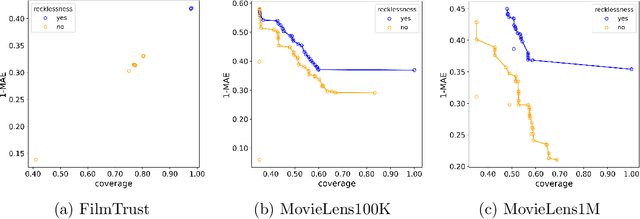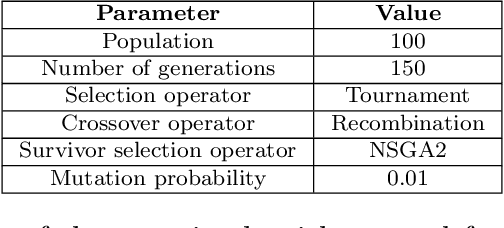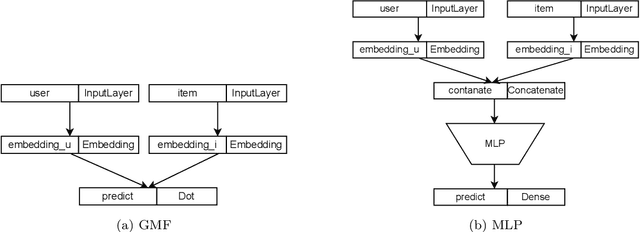Jorge Dueñas-Lerín
Comprehensive Evaluation of Matrix Factorization Models for Collaborative Filtering Recommender Systems
Oct 23, 2024Abstract:Matrix factorization models are the core of current commercial collaborative filtering Recommender Systems. This paper tested six representative matrix factorization models, using four collaborative filtering datasets. Experiments have tested a variety of accuracy and beyond accuracy quality measures, including prediction, recommendation of ordered and unordered lists, novelty, and diversity. Results show each convenient matrix factorization model attending to their simplicity, the required prediction quality, the necessary recommendation quality, the desired recommendation novelty and diversity, the need to explain recommendations, the adequacy of assigning semantic interpretations to hidden factors, the advisability of recommending to groups of users, and the need to obtain reliability values. To ensure the reproducibility of the experiments, an open framework has been used, and the implementation code is provided.
* 10 pages, 5 figures
Incorporating Recklessness to Collaborative Filtering based Recommender Systems
Aug 03, 2023



Abstract:Recommender systems that include some reliability measure of their predictions tend to be more conservative in forecasting, due to their constraint to preserve reliability. This leads to a significant drop in the coverage and novelty that these systems can provide. In this paper, we propose the inclusion of a new term in the learning process of matrix factorization-based recommender systems, called recklessness, which enables the control of the risk level desired when making decisions about the reliability of a prediction. Experimental results demonstrate that recklessness not only allows for risk regulation but also improves the quantity and quality of predictions provided by the recommender system.
Deep Neural Aggregation for Recommending Items to Group of Users
Jul 18, 2023



Abstract:Modern society devotes a significant amount of time to digital interaction. Many of our daily actions are carried out through digital means. This has led to the emergence of numerous Artificial Intelligence tools that assist us in various aspects of our lives. One key tool for the digital society is Recommender Systems, intelligent systems that learn from our past actions to propose new ones that align with our interests. Some of these systems have specialized in learning from the behavior of user groups to make recommendations to a group of individuals who want to perform a joint task. In this article, we analyze the current state of Group Recommender Systems and propose two new models that use emerging Deep Learning architectures. Experimental results demonstrate the improvement achieved by employing the proposed models compared to the state-of-the-art models using four different datasets. The source code of the models, as well as that of all the experiments conducted, is available in a public repository.
Neural Group Recommendation Based on a Probabilistic Semantic Aggregation
Mar 13, 2023Abstract:Recommendation to groups of users is a challenging subfield of recommendation systems. Its key concept is how and where to make the aggregation of each set of user information into an individual entity, such as a ranked recommendation list, a virtual user, or a multi-hot input vector encoding. This paper proposes an innovative strategy where aggregation is made in the multi-hot vector that feeds the neural network model. The aggregation provides a probabilistic semantic, and the resulting input vectors feed a model that is able to conveniently generalize the group recommendation from the individual predictions. Furthermore, using the proposed architecture, group recommendations can be obtained by simply feedforwarding the pre-trained model with individual ratings; that is, without the need to obtain datasets containing group of user information, and without the need of running two separate trainings (individual and group). This approach also avoids maintaining two different models to support both individual and group learning. Experiments have tested the proposed architecture using three representative collaborative filtering datasets and a series of baselines; results show suitable accuracy improvements compared to the state-of-the-art.
 Add to Chrome
Add to Chrome Add to Firefox
Add to Firefox Add to Edge
Add to Edge